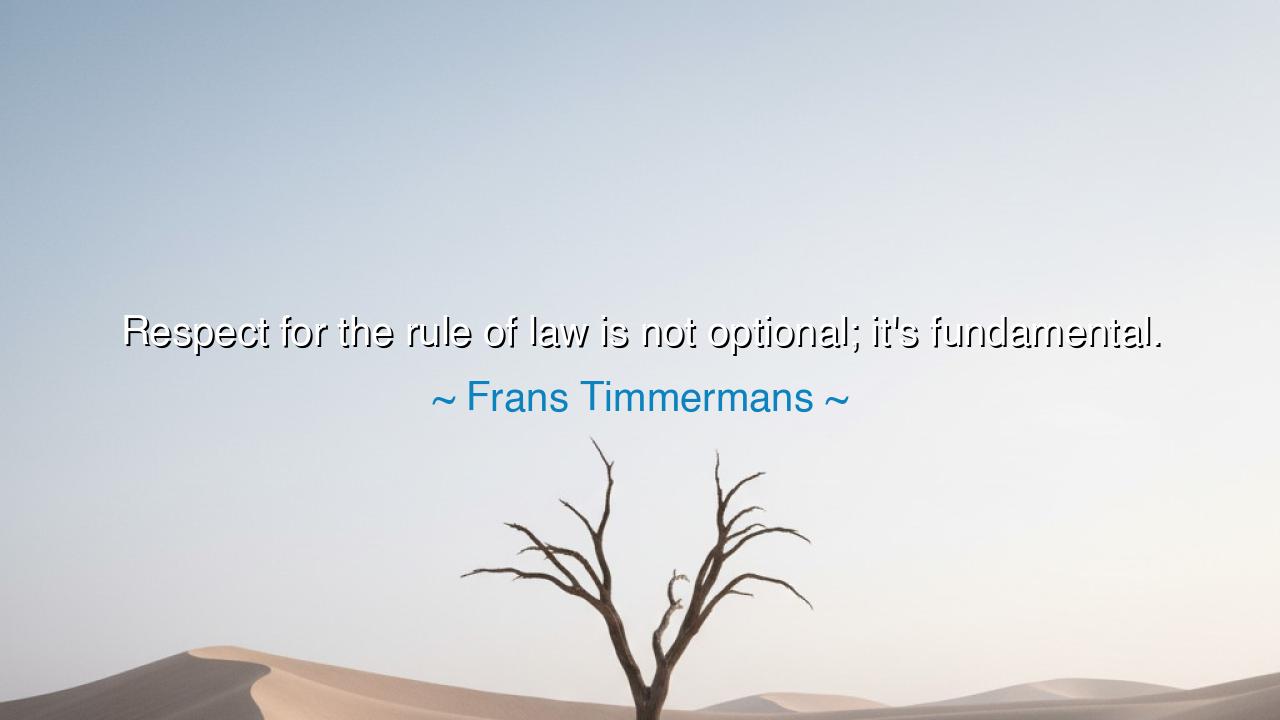
Respect for the rule of law is not optional; it's fundamental.






Hearken, O seekers of wisdom, to the words of Frans Timmermans, who declared with steadfast voice: “Respect for the rule of law is not optional; it’s fundamental.” This utterance, though born in the halls of modern governance, carries the weight of eternal truth. It is a reminder that civilizations do not stand upon shifting sands of whim and passion, but upon the firm foundation of justice and order. Without such reverence for law, even the mightiest of kingdoms will crumble into dust, as surely as empires once mighty lie silent beneath the ruins of time.
The rule of law is no mere policy, no fleeting decree of rulers. It is the great tether that binds the strong and the weak alike, so that neither may devour the other unchecked. It is the shield of the widow, the orphan, and the wanderer; it is the bridle upon the tyrant’s chariot. To say that it is fundamental is to say that it is as necessary as breath to life, as water to the earth. Without it, what remains is chaos, where the hand of the powerful seizes at will, and the cry of the innocent is silenced.
Recall, if you will, the fate of the Roman Republic. In its earliest days, when respect for law was revered, Rome flourished. Citizens trusted the courts, magistrates were bound by oath, and no man, however noble, stood above the statutes of the Senate and the people. But when ambition overtook reverence, and when leaders began to bend the laws to suit their lust for power, the Republic faltered. Civil war tore the land, and freedom gave way to autocracy. Thus history teaches us: where respect for the law is abandoned, liberty follows it into the grave.
Yet, we must not look only to the ancient past. In our own age, nations have risen from the ashes of oppression only by clinging to the sanctity of law. Consider South Africa after the fall of apartheid. It was not vengeance that forged its fragile peace, but the establishment of a just order under law, where truth could be spoken, wrongs confessed, and all men held equal under the same standard. This choice preserved the nation from the abyss of retribution and proved once more that respect for law is the very cornerstone of healing and rebirth.
The words of Timmermans remind us that respect is not a choice we exercise when convenient, nor a courtesy to be extended when it pleases us. It is a duty, binding upon all. Just as the stars are faithful in their course and the rivers in their flow, so too must humanity be faithful in upholding the rule of law. To forsake it is to invite anarchy, to unleash the wolves upon the fold.
From this teaching springs a lesson clear and urgent: each of us, whether ruler or servant, great or humble, must guard the law with reverence. In our dealings, let us not seek the crooked path of advantage, but walk uprightly, for each broken rule is a wound in the body of society. To honor the law is to honor the bond that unites all, and to dishonor it is to strike at the roots of our own dwelling.
Therefore, let every soul take up this charge: defend the law, obey the law, strengthen the law. If you are a leader, do not wield it as a weapon but as a trust. If you are a citizen, do not scorn its authority but shape your life in harmony with it. In small things—such as honesty in trade, fairness in judgment, and integrity in promise—you preserve the greater harmony of your community. For the fortress of civilization is not built in grand decrees alone, but in the daily obedience of its people.
And so, O children of the future, carry these words as a lantern through the ages: “Respect for the rule of law is not optional; it’s fundamental.” In them lies the survival of nations, the safety of the weak, and the dignity of the strong. Guard them well, and you shall walk a path of justice that no storm of tyranny may overthrow.






AAdministratorAdministrator
Welcome, honored guests. Please leave a comment, we will respond soon